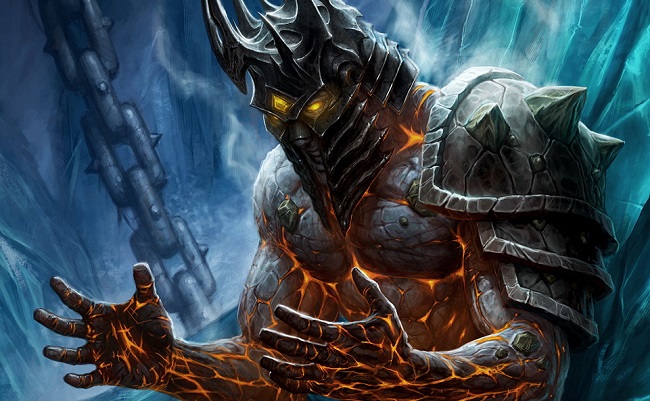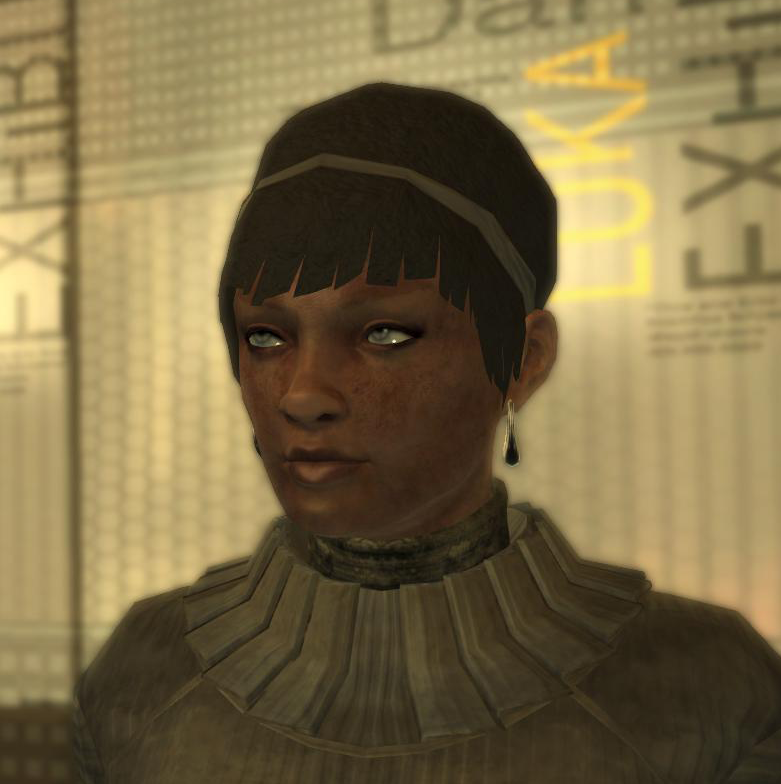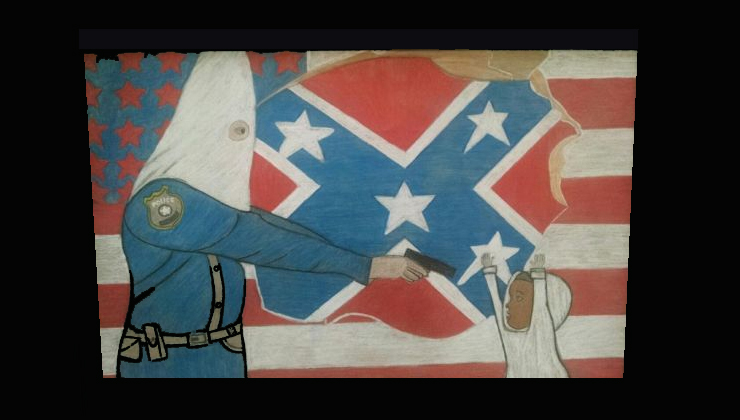This past week came with the release of three big (and much awaited…for me) titles, Super Mario Odyssey, Assassin’s Creed: Origins, and Wolfenstein II. Most of us are well aware of the uproar surrounding Wolfenstein II before its release. Certain segments of the internet were irrationally angry about the idea of shooting Nazis (because apparently now Nazis are the good guys?). Nevermind the fact that the entire Wolfenstein series has revolved around the premise of shooting Nazis (albeit never on American soil in an alternate timeline). I have to admit that Bethesda Softworks’ doubling down on marketing focusing on the killing of Nazis did ultimately spur me on to not only purchase, but pre-order the game. In recent months, I have begun to focus on making sure that I purchase games at launch that are attempting to do something innovative and ground breaking, or otherwise make the games community (and games themselves) better and more analytical. In the same way that I am not purchasing games that add to the toxicity of the community I feel in some way obligated to support the ones that actively work against the toxic natures of some members of the games community.
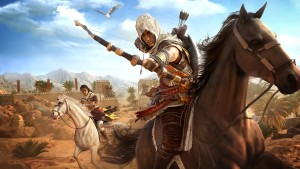 The same held true for Ubisoft’s Assassin’s Creed: Origins. While I was excited for the prospect of playing an assassin of color in a full fledged game for full sized console that promised to better than the previous offering of the sort, I was skeptical about purchasing the game before seeing reviews and gameplay (if at all). And then a few weeks before launch Ubisoft announced that they would be releasing a combat and story free exploratory mode for the game that would allow players to walk around and explore the everyday goings on in Egypt. This was huge. I know parents and teachers alike who have been using previous games in the Assassin’s Creed series to teach students about the art, architecture, and culture of other lands, but who have been faced with pointing out the inaccuracies in games that could otherwise wonderfully serve double duty. Hearing about the prospect of a game that would lend itself to those same kinds of educational experiences while being more historically and culturally accurate and being devoid of the specific gameplay elements (i.e. assassinations) that have made it difficult to get approval to use them from school boards and administrators is promising and leaves me optimistic. While the blowback against Ubisoft for the prospect of releasing an exploratory mode, months after the launch of the game (that no one is required to play for moral, social, or narrative reasons) was much less than for backlash over the killing of Nazis in America it was still oddly disturbing and attributed to the fact that I ultimately pre-ordered a game that looked as if it was going to be solid and had a protagonist of color. If developers are going make protagonists of color and do them well (regardless of their role) I almost feel honor bound to financially support that project so that they will be encouraged to do more, because we are all fully aware that no matter how well done a Black, Latinx, Native American, etc. character is done, if the game does not sell we won’t see more of the same.
The same held true for Ubisoft’s Assassin’s Creed: Origins. While I was excited for the prospect of playing an assassin of color in a full fledged game for full sized console that promised to better than the previous offering of the sort, I was skeptical about purchasing the game before seeing reviews and gameplay (if at all). And then a few weeks before launch Ubisoft announced that they would be releasing a combat and story free exploratory mode for the game that would allow players to walk around and explore the everyday goings on in Egypt. This was huge. I know parents and teachers alike who have been using previous games in the Assassin’s Creed series to teach students about the art, architecture, and culture of other lands, but who have been faced with pointing out the inaccuracies in games that could otherwise wonderfully serve double duty. Hearing about the prospect of a game that would lend itself to those same kinds of educational experiences while being more historically and culturally accurate and being devoid of the specific gameplay elements (i.e. assassinations) that have made it difficult to get approval to use them from school boards and administrators is promising and leaves me optimistic. While the blowback against Ubisoft for the prospect of releasing an exploratory mode, months after the launch of the game (that no one is required to play for moral, social, or narrative reasons) was much less than for backlash over the killing of Nazis in America it was still oddly disturbing and attributed to the fact that I ultimately pre-ordered a game that looked as if it was going to be solid and had a protagonist of color. If developers are going make protagonists of color and do them well (regardless of their role) I almost feel honor bound to financially support that project so that they will be encouraged to do more, because we are all fully aware that no matter how well done a Black, Latinx, Native American, etc. character is done, if the game does not sell we won’t see more of the same.
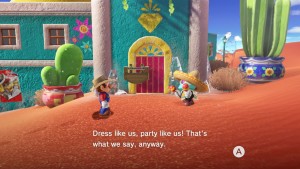 The final game that I want to mention is actually the game that I have probably played the most since it’s launch, Super Mario Odyssey. The platformer is far from my favorite genre of game, or the one that I was best at (but I wanted to be). I came to platformers relatively late in my gaming life and I’ve never been particularly good at them, so when they announced that this latest Mario game game going to be an open world game I was excited. This was going to give me the same chance as the old Mario RPGs that I had loved so well. And play it I have. I have a personal save, a stream save, and a co-op save for playing with my daughter. I played nothing else for at least two days. It took me that long after launch to even start Assassin’s Creed and I have never even clicked on Wolfenstein II. Super Mario Odyssey is fun for all of the reasons I detail in my post from last week, but it also hit a snag or two for me pretty early on. The first came in the Sand Kingdom. While it was bad enough that all of the NPCs were skeletons with sugar skull faces wearing sombreros and ponchos I immediately felt a sense of dread when I noticed that they sold the same outfit for Mario in the store. I was worried that for some unforeseen reason that I wasn’t going to be able to ever leave this level of the game without wearing it, which essentially meant that I was never going to progress beyond that level because there was no way that I was going to do that. Luckily, it wasn’t as drastic as that, but because of that costume I will never be able to 100% Super Mario Odyssey. Even after buying the alternate (and significantly more expensive) costume for this world I am not able to enter the padlocked door that is guarded by the sugar skulled skeleton (shaking maracas of course–like all of the others) who simply says to me over and over again “Dress like us, party like us! That’s what we say, anyway!” So I guess I won’t be partying with this guy (or the Power Moon that is likely behind that locked door) any time soon. N.B. that Moe-Eye guys (representative of the Moai statues of Easter Island) also live in the kingdom (which apparently conflates Mexican and Polynesian environments) and Mario is meant to take over their bodies (and displace the sacred spirits that are stored there according to Polynesian culture?).
The final game that I want to mention is actually the game that I have probably played the most since it’s launch, Super Mario Odyssey. The platformer is far from my favorite genre of game, or the one that I was best at (but I wanted to be). I came to platformers relatively late in my gaming life and I’ve never been particularly good at them, so when they announced that this latest Mario game game going to be an open world game I was excited. This was going to give me the same chance as the old Mario RPGs that I had loved so well. And play it I have. I have a personal save, a stream save, and a co-op save for playing with my daughter. I played nothing else for at least two days. It took me that long after launch to even start Assassin’s Creed and I have never even clicked on Wolfenstein II. Super Mario Odyssey is fun for all of the reasons I detail in my post from last week, but it also hit a snag or two for me pretty early on. The first came in the Sand Kingdom. While it was bad enough that all of the NPCs were skeletons with sugar skull faces wearing sombreros and ponchos I immediately felt a sense of dread when I noticed that they sold the same outfit for Mario in the store. I was worried that for some unforeseen reason that I wasn’t going to be able to ever leave this level of the game without wearing it, which essentially meant that I was never going to progress beyond that level because there was no way that I was going to do that. Luckily, it wasn’t as drastic as that, but because of that costume I will never be able to 100% Super Mario Odyssey. Even after buying the alternate (and significantly more expensive) costume for this world I am not able to enter the padlocked door that is guarded by the sugar skulled skeleton (shaking maracas of course–like all of the others) who simply says to me over and over again “Dress like us, party like us! That’s what we say, anyway!” So I guess I won’t be partying with this guy (or the Power Moon that is likely behind that locked door) any time soon. N.B. that Moe-Eye guys (representative of the Moai statues of Easter Island) also live in the kingdom (which apparently conflates Mexican and Polynesian environments) and Mario is meant to take over their bodies (and displace the sacred spirits that are stored there according to Polynesian culture?).
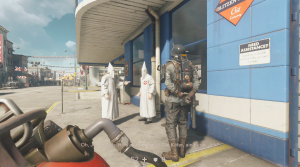 As I sit back and think about these three games this week (and play more of all of them) one of the things that strikes me about them all is the ways that they all deal with racial and cultural representation and (in some cases) how the gaming community is responding to this representation. With Wolfenstein II Bethesda comes out of the gate with more of the same old thing only to find themselves forced into a social media situation where they do draw explicit connections between the game and the current political situation in the United States. No one can be certain if this would have ever transpired if they were not initially attacked by Nazi sympathizers who were angered by the idea of shooting Nazis in America. In the case of Ubisoft and Assassin’s Creed: Origins playing through the first several hours of the game itself made me wonder why the same folks who were so angered by Wolfenstein II were not also angered by Origins. One of the things that stuck out to me most about my game play is that many of the situations that Bayek, our assassin (a medjay–ancient Egyptian elite paramilitary force member) this time around, tasks himself to handle are situations that have very specific political placement at this historic moment. This is not to say that this is an intentional alignment with what is going on today as much as it is just a political pattern that we see in oppressive governments throughout history. Is it because it is absent certain political buzzwords and requires both analysis and a basic understanding of world history that it flies under the radar? Just something to consider. Finally the game that I was most surprised about (because I was staying media dark as much as possible) is Super Mario Odyssey. I am astounded at the reliance on stereotypes in the Sand Kingdom. Still wondering how that passed review when upon seeing it for the first time even my 9 year old responded with “And who thought that was ok?!?”
As I sit back and think about these three games this week (and play more of all of them) one of the things that strikes me about them all is the ways that they all deal with racial and cultural representation and (in some cases) how the gaming community is responding to this representation. With Wolfenstein II Bethesda comes out of the gate with more of the same old thing only to find themselves forced into a social media situation where they do draw explicit connections between the game and the current political situation in the United States. No one can be certain if this would have ever transpired if they were not initially attacked by Nazi sympathizers who were angered by the idea of shooting Nazis in America. In the case of Ubisoft and Assassin’s Creed: Origins playing through the first several hours of the game itself made me wonder why the same folks who were so angered by Wolfenstein II were not also angered by Origins. One of the things that stuck out to me most about my game play is that many of the situations that Bayek, our assassin (a medjay–ancient Egyptian elite paramilitary force member) this time around, tasks himself to handle are situations that have very specific political placement at this historic moment. This is not to say that this is an intentional alignment with what is going on today as much as it is just a political pattern that we see in oppressive governments throughout history. Is it because it is absent certain political buzzwords and requires both analysis and a basic understanding of world history that it flies under the radar? Just something to consider. Finally the game that I was most surprised about (because I was staying media dark as much as possible) is Super Mario Odyssey. I am astounded at the reliance on stereotypes in the Sand Kingdom. Still wondering how that passed review when upon seeing it for the first time even my 9 year old responded with “And who thought that was ok?!?”
Ultimately a week of gaming like this one demonstrates that while there have been advancements in games, narrative, and diversity (and in the community of people who make and play games) that there is still room for improvement and that our passion for games may be the thing that best leads us forward.

